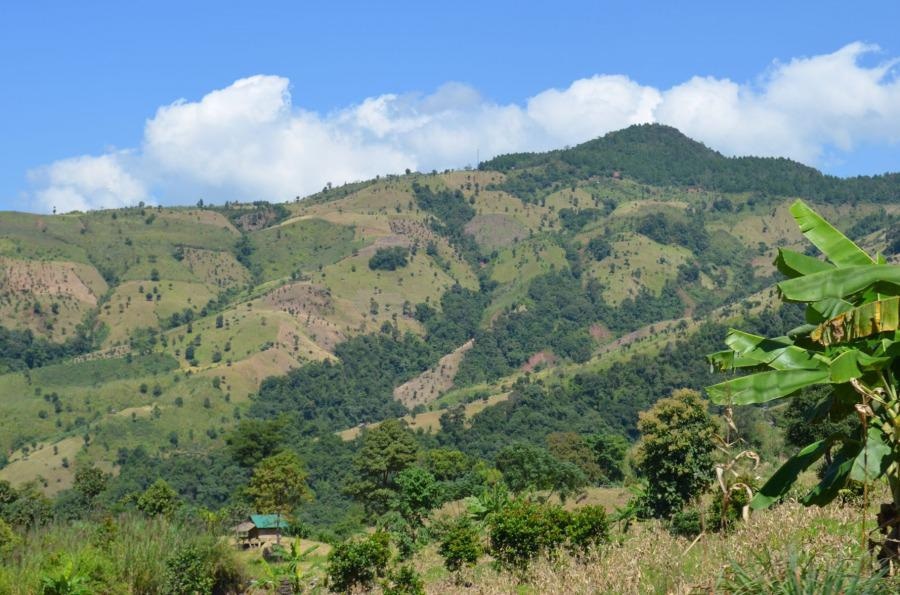Scientists from the Department of Civil Engineering at the University of Hong Kong (HKU) and Southern University of Science and Technology (SUSTech) have discovered that tropical carbon loss has doubled for the last 20 years as a result of excessive forest removal in the tropics. This was discovered with the help of multiple high-resolution satellite datasets.
 Forest loss in sloping lands replaced by agricultural plantations in Nan province, Thailand. Image Credit: Zhenzhong Zeng.
Forest loss in sloping lands replaced by agricultural plantations in Nan province, Thailand. Image Credit: Zhenzhong Zeng.
The tropics are considered a crucial ecosystem as they have the capacity to store enormous amounts of carbon in their woody vegetation and soil. However, they have suffered from wide forest clearance since 2001.
The scientists analyzed the gross forest carbon loss connected with forest removal in the tropics (between 23.5° N and 23.5 S but barring northern Australia) during the 21st century.
They disclosed a dual increase in gross tropical forest carbon loss globally from 0.97 gigatons of carbon annually in 2001–2005 to 1.99 gigatons of carbon per year in 2015–2019 as a result of quick forest loss.
The study has been reported in the academic journal Nature Sustainability.
The findings are critical because they suggest that existing strategies to reduce forest loss are questionable; this failure underscores the importance of monitoring deforestation trends following one of the new pledges made—to halt and reverse deforestation—by UN climate summit-the twenty-sixth Conference of the Parties (COP26) in Glasgow in November 2021.
Ji Chen, Professor, Department of Civil Engineering, University of Hong Kong
Tropical forests are considered to be the largest terrestrial component of the global carbon cycle. It has the ability to store nearly 250 gigatons of biomass carbon in its woody vegetation and absorb almost 70 gigatons of atmospheric carbon annually via the process of photosynthesis.
The quick and stable loss of forests can be destructive since it results in the loss of stored carbon in soil and biomass. Furthermore, deforestation impedes carbon sequestration or the process of capturing and holding carbon dioxide.
The doubling and acceleration in the loss of forest carbon, including biomass and soil organic carbon, is primarily driven by agricultural expansion which differs from current estimates of land-use change emissions in the assessments of the global carbon budget that shows a flat or decreasing trend.
Yu Feng, PhD Candidate, University of Hong Kong
Yu Feng, who is also a candidate of the SUSTech joint program added, “In addition to carbon, conversion of forests to agricultural lands also induces other environmental consequences, like biodiversity extinction and land degradation.”
The majority of the tropical forest carbon loss (82%) was triggered by agricultural expansion, for instance, shifting cultivation, specifically in Africa.
While some agricultural lands may reappear as forested due to abandonment or policies, we still observed about 70% of former forest lands converted to agriculture in 2001–2019 remained so in 2020, confirming a dominant role of agriculture in long-term pan-tropical carbon reductions on formerly forested landscapes.
Dr. Zhenzhong Zeng, Research Team Member and Associate Professor, Southern University of Science and Technology
“The 2014 New York Declaration on Forests promised to halve tropical deforestation by 2020. However, our results demonstrate a failure to the commitment and highlight the colossal challenge posed by the 2021 Glasgow Leaders’ Declaration on Forests and Land Use, which pledges to halt forest loss by 2030,” stated Dr. Chunmiao Zheng, Chair Professor at SUSTech and a member of the research team.
Journal Reference:
Feng, Y., et al. (2022) Doubling of annual forest carbon loss over the tropics during the early twenty-first century. Nature Sustainability. doi.org/10.1038/s41893-022-00854-3.